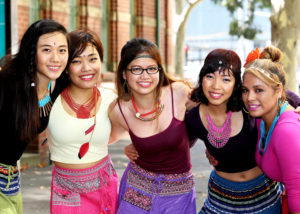Migrant women find independence and opportunity in Australia
 Migrant women in Australia find life healthier, wealthier and more independent than in their home countries, according to a new survey.
Migrant women in Australia find life healthier, wealthier and more independent than in their home countries, according to a new survey.
An overwhelming majority of women migrants find life in Australia ‘better’ than in their home countries and believe they have more rights than at home.
Most say they have more opportunities here than at home and are more financially independent.
And overwhelmingly they say they have more control over their daily lives here in Australia and believe men and women should have equal access to opportunity.
The survey of 120 new women migrants and refugees from non-English speaking countries, commissioned by refugee and migrant settlement agency AMES Australia, also found that migrant women in Australia have more access to a range of services and activities including education, work, women’s health, child care, driving a car and political and religious activity.
The survey asked ‘As a women is life in Australia better for you than in your home country?’ Seventy-three per cent of respondents said ‘yes’ and eight per cent said ‘no’ while 15 per cent said there was no difference.
Eighty-six per cent of women said they had more rights in Australia than in their home country while 7 per cent said they did not.
Seventy per cent of the survey respondents said there were more opportunities for women in Australia than at home while 13 per cent disagreed.
Asked about particular services or activities that could be accessed in Australia, 67 per cent said education and women’s health services were easier to access in Australia.’
Fifty-nine per cent said work was more accessible in Australia, while 54 per cent cited driving a car as being easier in Australia and 57 per cent said child care was more accessible.
Meanwhile 28 per cent said religious activities were more accessible in their home countries and 28 per cent said work was easier to come by.
An overwhelming 80 per cent of respondents said Australian women were more independent than women in their home countries.
Sixty-six per cent said they were more financially independent in Australia while 17 per cent said they were less financially independent and 17 per cent said there was no difference.
Seventy-three per cent of women said they had more control over their daily lives and five per cent said they had less control while 22 per cent said there was no difference.
AMES Australia CEO Cath Scarth said the survey showed that women migrants and refugees new to Australia are optimistic about their new country and are striving to become part of the wider society.
“What the survey tells us is that women migrant and refugees who come to this country appreciate the level of equality we have and the opportunities that are available to women here,” Ms Scarth said.
“It shows that most migrants value our services and institutions and want to make the most of what this country offers them,” she said.
Laurie Nowell
AMES Australia Senior Journalist












